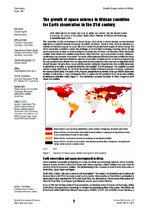The growth of space science in African countries for earth observation in the 21st century
Abstract
The vulnerability of Africa to the impact of climate change, which results in natural disasters and environmental degradation, accelerates hardship and poverty for millions of Africans. However, Africa still lacks the necessary scientific and technical capacity to assess fully and to monitor the possible future impacts of climate change. One of the instruments available to address the challenges of environmental monitoring (including climate change)and to provide early warnings of natural and human-made disasters for Africa's development is Earth observation satellites. Earth observation satellites record Earth's information from space and provide accurate, continuous, simultaneous measurements of our planet. The results of the application of Earth observation satellites have long term social benefits which include the early detection of hurricanes and typhoons that can lead to prompt warnings for areas predicted to be affected, thus providing crucial time to implement safety measures to mitigate the effects of such disasters. Several authors concur with this position, stating that the global view from satellite observation is unmatched in its ability to capture the dynamics and variability of Earth processes. The capability to predict weather (among other things) has led Earth observation satellites to become essential to everyday applications that improve human safety and quality of life. However, despite the many benefits of the use of Earth observation satellites, it still remains a major challenge for Africa to explore the full potential of Earth observation satellites in addressing continental needs (Figure 1). This commentary assesses the status of Africa in regard to Earth observation satellites.

